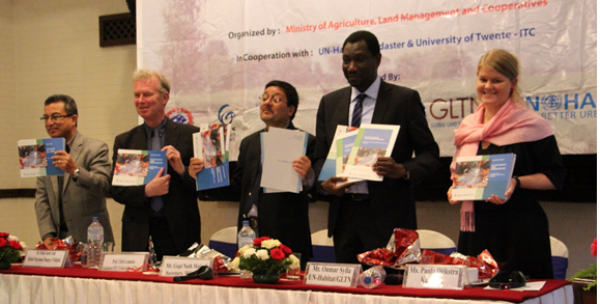UN-Habitat Supports Nepal Government in Conducting Training Workshop and National Consultation Symposium on Fit for Purpose Land Administration – From Policy to Implementation

Kathmandu, UN-Habitat supports Ministry of Agriculture, Land Management and Cooperatives (MoALMC) in its mission for implementing pro-poor and gender-responsive land administration in Nepal. One of them is a study into a Fit-For-Purpose Land Administration Country Strategy. As part of this support, a four days training workshop followed by a national consultation symposium on Fit for Purpose Land Administration – From Policy to Implementation were conducted on 25-28 June 2018 in Dhulikhel and 29 June 2018 in Kathmandu. The events were organized by Ministry of Agriculture, Land Management and Cooperatives (MoALMC) with the support of School for Land Administration Studies of the University of Twente (ITC), the Netherlands’ Cadastre, Land Registry and Mapping Agency (Kadaster) together with UN-Habitat/Global Land Tool Network (GLTN).
The training workshop and the national consultation symposium focused on the Spatial, Institutional and Legal Frameworks to the development and implementation of a Fit-For-Purpose Land Administration (FFP LA) in the post-earthquake disaster and the post-constitution context in supporting the Land Policy and the 58-point transformation roadmap of the land and tenure sector in Nepal. Earlier GLTN supported in the process including research on the FFP-LA country strategy. As a follow up to this process, FFP-LA principles, approaches and theory were introduced at the Workshop. The spatial, legal and institutional frameworks of the Fit-For-Purpose Land Administration approach were presented and discussed in detail. The training workshop at Dhulikhel was a residential workshop and the participants could fully devote on the workshop. There were altogether 29 participants coming from 14 different organizations which included different government, non-government organizations, INGOs, private organizations and academic institution in Nepal and some 31% were women.
The training workshop was followed by a 1-day National Consultation Symposium with the aim to have a meeting between the participants of the 4-day Training Workshop, international experts, decision makers and key land stakeholders to discuss FFP-LA Strategy implementation in Nepal. The programme draw on a wide range of national and international expertise and achieved learning through practical examples of successful application of the tools mainly in Nepal and elsewhere. There were altogether 86 participants among which about 30% were female representing different organizations which included government, non-government, NGOs/CBOs, INGOs, private sector and academic institutions in Nepal.
The consultation focused in relation to Global Land Tool Network (GLTN) tools to support sustainable land governance by Mr. Oumar Sylla from UN-Habitat/GLTN, Nairobi. Similarly, Prf. Chrit Lemmen from Kadaster and ITC presented the trends and experiences in implementing FFP-LA. Ms. Paula Dijkstra from Kadaster shared the experience on the piloting FFP-LA approach in Dolakha. Mr. Gopal Giri from MoALMC highlighted on the key features of the draft national land policy which has a base on the Continuum principles to addressing to the security of different existing land tenure types in Nepal. The event was marked by the official release of the document “Fit-For-Purpose Land Administration- A country level implementation strategy for Nepal” and the key highlights of the document was presented by Joint Secretary Mr. Janak Raj Joshi from MoALMC. Secretary Mr. Gopi Nath Minali (MoALMC) expressed commitment of the Ministry to the provisions of land tenure security and good land governance to achieve the Sustainable Development Goals. He shared that the land policy under discussions has addressed these issues and highlighted on the importance of capacity development including human resources to address these issues.
Action plan on Spatial, Institutional and legal framework as developed in the Workshop were presented. The programme provided a platform for an open discussion between all the concerned stakeholders on the Fit for Purpose approach to land administration on using innovative concepts and technologies aligned with the purpose of securing land rights for all which are quick, more affordable and more effective leading to sustainable social and economic development. The feedback provided will help to promote and implement appropriate land policies using FFP tools and approaches that are pro-poor, gender responsive, effective and sustainable in the post-Constitution and post-earthquake recovery context.
The publication can be downloaded here
Main Report Fit-For-Purpose Land Administration ( A country level implementation strategy for Nepal)
Summary Report Fit-For-Purpose Land Administration ( A country level implementation strategy for Nepal)
of the 4-day Training Workshop, international experts, decision makers and key land stakeholders to discuss FFP-LA Strategy implementation in Nepal. The programme draw on a wide range of national and international expertise and achieved learning through practical examples of successful application of the tools mainly in Nepal and elsewhere. There were altogether 86 participants among which about 30% were female representing different organizations which included government, non-government, NGOs/CBOs, INGOs, private sector and academic institutions in Nepal.
The consultation focused in relation to Global Land Tool Network (GLTN) tools to support sustainable land governance by Mr. Oumar Sylla from UN-Habitat/GLTN, Nairobi. Similarly, Prf. Chrit Lemmen from Kadaster and ITC presented the trends and experiences in implementing FFP-LA. Ms. Paula Dijkstra from Kadaster shared the experience on the piloting FFP-LA approach in Dolakha. Mr. Gopal Giri from MoALMC highlighted on the key features of the draft national land policy which has a base on the Continuum principles to addressing to the security of different existing land tenure types in Nepal. The event was marked by the official release of the document “Fit-For-Purpose Land Administration- A country level implementation strategy for Nepal” and the key highlights of the document was presented by Joint Secretary Mr. Janak Raj Joshi from MoALMC. Secretary Mr. Gopi Nath Minali (MoALMC) expressed commitment of the Ministry to the provisions of land tenure security and good land governance to achieve the Sustainable Development Goals. He shared that the land policy under discussions has addressed these issues and highlighted on the importance of capacity development including human resources to address these issues.
Action plan on Spatial, Institutional and legal framework as developed in the Workshop were presented. The programme provided a platform for an open discussion between all the concerned stakeholders on the Fit for Purpose approach to land administration on using innovative concepts and technologies aligned with the purpose of securing land rights for all which are quick, more affordable and more effective leading to sustainable social and economic development. The feedback provided will help to promote and implement appropriate land policies using FFP tools and approaches that are pro-poor, gender responsive, effective and sustainable in the post-Constitution and post-earthquake recovery context.
The publication can be downloaded here
Main Report Fit-For-Purpose Land Administration ( A country level implementation strategy for Nepal)
Summary Report Fit-For-Purpose Land Administration ( A country level implementation strategy for Nepal)





